Last week was one of the wildest I’ve ever had on this site. Among everything that happened, I was continually impressed with how our community responded: people showed up on a moment’s notice to testify at council, people wrote letters, they spoke out at meetings, organized events — and of course, many of you wrote comments.
So much of what we do here at BikePortland is made better by having a very open and accessible comment section. Out of the 422 (and counting) comments on our six Broadway bike lane stories last week, there were many that deserve to be singled out. But the one I’ve chosen for Comment of the Week stands apart. It’s a comment on my podcast interview with Mapps from reader MelK that I think nails some very important aspects of the controversy, and gets at the larger issue of how many politicians totally misread what we do here.
Read her comment below:
Towards the end of the interview, Mapps makes a comment about having to take into account all Portlanders’ concerns, while claiming that Jonathan only has to concern himself with BikePortland readers/cyclists. This is a false dichotomy. Yes, we read BikePortland, but many of us are here not because we identify as “cyclists,” but because we are regular Portlanders just trying to move through our city and want to do so safely. Aside from walking, biking is the cleanest, healthiest, most affordable, and most environmentally and socially just form of transportation. I am one of the “all Portlanders” that Mapps speaks of; it just so happens that my usual mode is the one that reflects the values I’m trying to impart to my kids and my community: one that emits no carbon dioxide or particulate pollution, one that causes far fewer fatalities and severe injuries than driving, one that improves my physical health, and one that ties me to my city and community. These are all things Commissioner Mapps claims he believes in and supports, and yet because I read BikePortland, I get lumped in as just a “cyclist.”
I don’t believe it’s a huge ask that our safety be prioritized over economic interests. When my husband and I put our 4- and 6-year-old on the back of our bikes to get them to and from school in the central city every day, it is imperative that we have protection. Automobile-related injuries and deaths are at an all-time high and it’s not easy to continue putting myself and my family in the “vulnerable road user” category. Yet we do it because we truly believe that biking is climate action, and as a parent I have to make the extremely difficult decision to weigh my kids’ long-term future against our short-term interests. The only way I know how to do that and not let the anxiety take over is to fight for safer and more equitable streets, which in turn will someday mean healthier and more resilient communities.
This should have been an easy one for Mapps. Getting complaints about a bike lane from wealthy business owners? Cool. Chat with them, make it clear that he can work with them if and only if any changes either maintain or add to the safety of his constituents, whose right to move themselves and their children from A to B safely is a priority. I was hoping for a PBOT commissioner and mayoral candidate who understands that, but Mapps clearly does not. Unfortunately, even if he appears to suddenly get it as we approach election day, we can no longer trust that he’s being honest and genuine about that.
Thank you MelK and all the others who contributed to an outstanding week of comments. You can read MelK’s comment in context here.



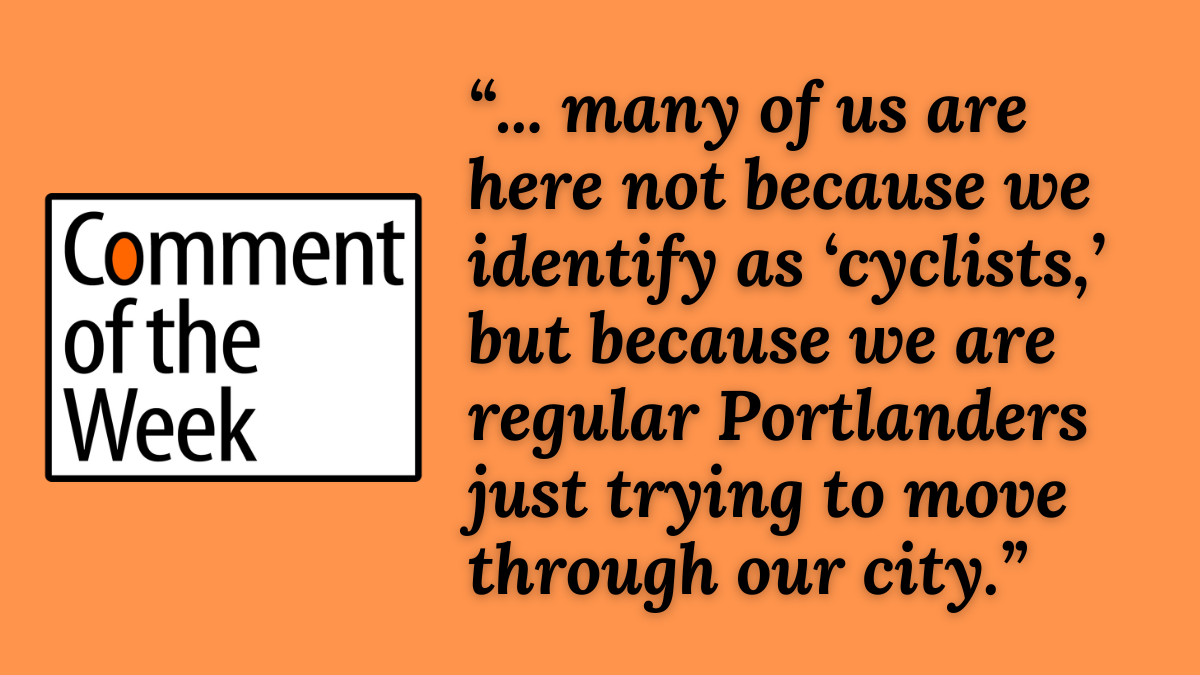
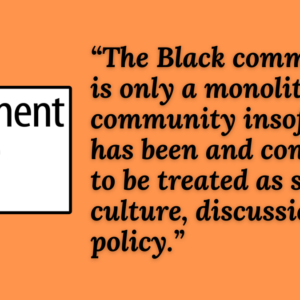
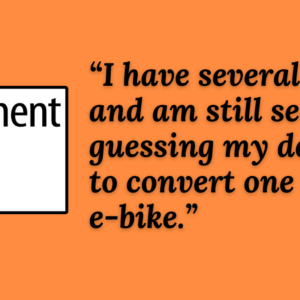
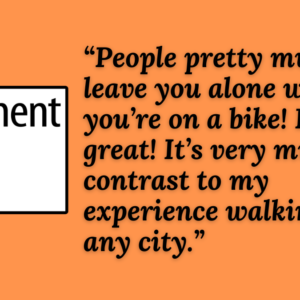
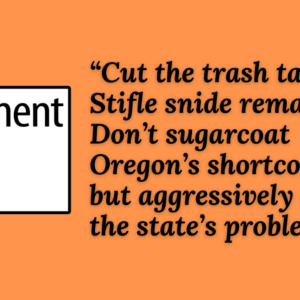
Thanks for reading.
BikePortland has served this community with independent community journalism since 2005. We rely on subscriptions from readers like you to survive. Your financial support is vital in keeping this valuable resource alive and well.
Please subscribe today to strengthen and expand our work.
Fully agree with this perspective. I was never one for spandex, and I haven’t ridden a bike with anything other than simple platform pedals in year, but I ride nearly every day. I ride my electric cargo bike to take my 4yo daughter to school every school day, even when it rains. With her on the back, we ride to the grocery store, library, picnic and playgrounds, to visit family, to see momma at work when she’s putting in 60 hour weeks and hasn’t seen her daughter at bedtime for almost a month. The two of us have hauled tomato cages and strawberry pots, a trestle leg desk (that did take 2 trips), and even a 3rd person (two adults and 1one 4yo!)
We’re just trying to get home alive without having to buy a $50k SUV.
Fantastic comment! So many Portlanders rely on streets like Broadway and need to have their interests valued and protected by the city. A solid organizing principle of public spaces is that they are built to insure the safety of the most vulnerable users. Next in the hierarchy of needs would probably be use that can accommodate the largest number of users with the least negative societal impact. Somewhere near the bottom would be the petty grievances of corporate hotel management that don’t hold up to scrutiny.
Unfortunately, for a desperate mayoral candidate, the priorities are reversed.
Yes, but think about the horror of the hotel porters who have to navigate a river infested by fire-breathing cyclists.
Mingus Mapps feels their pain more than the pain of cyclists who were actually doored and struck by cars in the former bike lanes.
It’s wild that people act as if there wasn’t conflict caused by hotel drop off before the new lanes were put in. I thought it was worse because the stakes were higher and people were more upset. Ride share drivers frequently parked half way in the bike lanes and unassuming visitors would be unloaded into the bike lanes, with people on bikes having to navigate between cars and bewildered pedestrians.
This is such a microcosm of Portland politics these days: Rich person yells about something they haven’t taken the time to objectively evaluate, and city councilors rush to placate them, knowing that they are wrong but hungry to use what little power they have to curry favor.
It’s about the bike lobby knowing that mode share has cratered and its influence has faltered.
Their key demographic (while collar workers) refuse to return to the office but we’re supposed to pretend that these facilities are vitally needed for a population of commuters who no longer work downtown?
This is just so much theater and I don’t feel like Mapps, the PBOT commissioner, the hotels or PBA are the ones being “dishonest” here.
You completely missed the point. Namely that many bicycle riders aren’t in that demographic. Frankly I rode and used those facilities a lot more when I wasn’t a white collar worker than I do now, because bicycles are cheap to ride and cars are expensive to drive. One runs on money and makes you fat, the other burns fat and saves you money.
It is a social equity issue when facilities such as these are removed as you force people of lesser economic means to choose between their safety and financial stability. So yes, Mapps, who claims to prioritize social equity, is being dishonest when he takes actions that explicitly go against social equity.
Joan C,
I disagree completely with your take. Pre-pandemic, Broadway had more bike traffic on it, and some percentage were office workers and City employees who are more likely to be working at home. But there are plenty of high school and college students, and people across the socio-economic scale that still use it. It is not part of my regular commute, but I find myself riding on Broadway at least once a week.
Broadway bike lane is useful for way more people than just downtown commuters. It is one of the only connection to the rest of SW Portland by linking up with Terwilliger. Broadway also goes through the heart of PSU.
Are we then also supposed to pretend that we vitally need 3 car lanes on Broadway?
Watch out, Joan C: I wear spandex, and I *vote*!
I almost feel bad for people who post comments like this. Like, is work the only thing you do? I telecommute but I still bike a lot for literally every other reason ranging from fun to going to the doctor.
Why should our entire transportation system be designed around moving people to and from office spaces? It’s such a depressing world view.
There’s a lot of life and travel that happens outside of going to and from work.
Joan isn’t all right, but not all wrong either. Joan is correct that so many WFHers were probably bike commuters. They, ya know, WFH now and the bike commute numbers are pathetic. Right, we all agree on this, yeah? As a cyclist I absolutely think this infrastructure should exist but if you don’t bike around as transportation, you probably think it’s a waste of space. I think the outer Division bike lanes are needed (and not perfect, but better than Division was), and my wife and I will sometimes use them even though we need to bike out of the way a little to do this. We do that because we want cyclists to be seen using this stuff. When folks out this way complain about these bike lanes and say “no one even uses them!”, shit, they’re not totally wrong. Hotels hate the bike lanes? No surprise. When so few people use the infrastructure it’s not hard to think that with enough griping, the right people doing the griping anyway, that this infrastructure might go away. I don’t think this is a stretch or hard to understand.
Thanks for this comment @ptb. I love the protected bike lanes on Broadway and am absolutely horrified by the idea that PBOT would remove them. But I also think it’s possible not to see the usefulness of the bike lanes and still be a human being worthy of respect. I am immensely grateful to Jonathan for covering this situation. I’ve written emails to the commissioners and signed the petitions to save the lanes and everything. But I also think we need to try hard to listen to people who think differently. I’m not seeing a lot of effort to understand different perspectives in these comments.
This is such a bad privileged take it’s unreal. What about all the delivery riders that have to navigate our streets on bike and Ebike to get those white collar wfh their DoorDash lunches?? They don’t deserve to be safe in protected bike lanes because they aren’t office workers? What about the families biking into downtown on the weekend to go shopping? What about literally anyone who lives in Portland that wants to ride on broadway and not be killed by distracted tourists trying to valet park I front of their hotels?
The thing is that the vast majority of those white collar workers didn’t bike to work. Some took transit but most drove.
So the bike lane is basically taking up space that could be used by while collar workers who “refuse to return to the office” and are no longer driving to work downtown.
Whoever it was that was biking to work downtown really isn’t doing it any longer. I work on a street that was formerly jammed with commuting cyclists out of downtown and in September ’23 it’s a sad shadow of what it was just before Covid hit. Fine, white collar workers all drove and the blue collar/service industry folks were biking. But if the white collar folks can work from home then who do the blue collar/service industry folks need to show up for? People aren’t biking in and out of downtown like they did before Covid, regardless of what type of work they were doing.
Yes, I agree. But my point was that people (regardless of collar color) also aren’t driving to work (or to shopping) the way they were before then, either. So yes, the bike lane is underutilized, but so are the vehicle lanes and parking spaces compared to what they were pre-Covid.
Joan’s “…we’re supposed to pretend that these facilities are vitally needed for a population of commuters who no longer work downtown?” was directed at bike facilities, but it also applies to vehicle facilities. Even the City acknowledges that, in its closing of a main Smart Park garage due to plummeting demand.
Less than 20% of trips taken are commutes. Commute mode share was never a relevant metric anyway. But even it if it was, the notion that bike lanes are “needed” or not is profoundly at odds with the basic freedom of each person to make choices that work best for them. It amounts to saying that your transportation mode of choice should only be safe for you if some arbitrary number of other people make the same choice. (And not for nothing, it’s bizarre to me to bring up commute mode share in the context of downtown, where drivers were a minority of the commuters pre-pandemic. It amounts to saying that Broadway doesn’t need a bike lane because most people who work on Kruse Way drive there.)
Commute trips have (had) the great advantage of being easy to count because, the theory went, everyone rode into and out of downtown each day and counting at the bridges is an obvious choice.
Things have changed, but we’re still stuck with that metric if we want to plot trends over time.
Pbot does have bike counters on the bridges, but that’s not where the commute mode share data comes from that everyone loves to wring their hands about. The commute numbers are self reported data from the census and the American community survey.
I personally have no use for the bike lanes on Broadway. I use Broadway all the time, and I just take the lane, because it never makes sense for me to merge over several lanes of traffic to make my left turn towards the Hawthorne Bridge on my way home. And yet, I feel it can’t be all bad, if other people ARE using them and perceiving value in them. Not to mention bonus points for the fact that they seem to be upsetting all the right people, namely our precious local bourgeoisie and Saintly Job Creators©. So what’s not to love??
Take the lane does more for safety than inferior protected lanes. Sometimes, they may be necessary, yet they are needed because we refuse to truly invest in the roads. The government is making deals with developers to over-develop for profit~ & it is no co-incidence that the bike meetings led by some bike organizations were handed over to developers as well. People ask why vehicular cyclists oppose “protected lanes”~ which is just another way to demean the category, as “spandex” is…
Well, because they are not cycletracks, they are inferior sidewalks that are shared with walkers. (Or very restricted lanes.) Additionally, the government then outlaws vehicular cycling where the protected lanes have been put in. The anti-car sentiment is an anti-road safety one as well, in fact, making poor decisions on road designs to appease a very small segment of the population. Meaning that this moment has been squandered and cycling has lost a vital moment to embed itself safely for the next half a century.
Democracy isn’t just force utilized by wielding organizations against others. A sad wake up call is coming in the future as good will and trust has been lost. Splitting the bike community, antagonizing others, and implementing, obviously, inferior designs has failed in its ostensible goals.
It makes me very sad…
Research has shown that protected bike lanes are in fact safer:
“Bike infrastructure, particularly physical barriers that separate bikes from speeding cars as opposed to shared or painted lanes, significantly lowered fatalities in cities that installed them.”
https://usa.streetsblog.org/2019/05/29/protect-yourself-separated-bike-lanes-means-safer-streets-study-says
If you’re against protected and separated bicycle paths then what are you advocating for regarding better infrastructure that could allow cyclists to move around the city safely?
I ride the protected path on Rosa Parks all the time and I find it very low stress and safe feeling, if it were just a regular car lane I probably wouldn’t ride on that road because it would put me in conflict with the aggressive car traffic that would be upset at my slow speed and likely pass me dangerously, which is exactly what I experience on Ainsworth which does not have a protected bike lane.
I actively go two blocks out of my way to ride on the Rosa Parks in the protected bike lane just to avoid the vehicular cycling on Ainsworth which feels stressful and dangerous and puts me in constant conflict with cars.
We know Mapps has been “in dialogue” with disgruntled business owners and apparently also grievance peddlers “PDX Real” regarding the Division St. medians. Has he ever met with any safe streets advocates? If not, that would seem to be a glaring oversight given his stated mission to take all Portlanders’ concerns into account.
Wow, a city councilor listening to people that Portland has intentionally ignored? What a novel concept.
Believe it or not the people of East Portland might have different opinions that don’t align with the new urbanist agendas of Street Trust, Bike Loud, Alta Planning, etc.
Please say more about these “different opinions,” Jeffrey. Do they by any chance relate to the promotion of a fossil-fuel-rich lifestyle?
Somehow I don’t think it’s the underserved folks out in East Portland that are begging Mapps and co. to waste millions of dollars removing a bike lane running through the heart of downtown.
ooh, “new urbanist agendas”, sounds scary! Probably cooked up in the basement of a pizza parlor in Washington DC, amirite? (eyeroll) Your perspective would get a better listen if you didn’t use dog whistle / scare tactics when trying to make your point.
Ignoring facts doesn’t help. Neoliberalism dressed in progressivism is still neoliberalism… It goes around local regulations to appease both those with an agenda to fix the problems that they cause and the profiteers who cannot build without encroaching on the community.
There are some people that should be intentionally ignored IMO
Some of us in East Portland do support the work of Street Trust, Bike Loud and Alta.
Believe it or not, people in lower income, outlying areas of the city actually DO value a lot of the same things that people in pricier neighborhoods who are acquainted with five dollar words like “new urbanism” do. Like ways for their kids to walk or bike to school and arrive intact. Trifling little details like that.
Having said that, I can see where the the business owners agitating against the changes to outer SE Division are coming from. That street is just ridiculously too narrow to safely and effectively support all the different transportation modes that have been shoehorned into it. I really don’t know what the answer is, short of a radical transformation of mode share away from private motor vehicles altogether.
As far as I’m concerned, the really unfortunate aspect to the story is less the understandable and reasonable frustrations of certain business owners, and more their deceitful weaponization at the hands of rancid reactionaries like the grotesquely sanctimonious, misnamed “Portland Dissent”, PDX Real, et al crowd, and fellow travelers. The latter always use the oldest, tiredest tactic in the book, mobilizing the most affluent property owning subsegment of a neighborhood to misleadingly ventriloquize the supposed sentiments of a much larger and lower income majority. Classic bourgeois class war tactics in action.
Does being a bicyclist make one more attuned to safety and hazards across our communities? I think there may be reasons it does. When Mapps held a press conference in response to July’s exceptionally deadly month of vehicular violence, the members of the public who showed up were bicyclists — even though, at that time, not a single bicyclist had been killed by vehicular violence in 2023. Some of this was due to the fact that Jonathan had posted about the last-minute press conference in advance, giving bicyclists a chance to attend. But I think it also reflects a larger experience: moving through the city at the pace we do, without metal and glass and plastic cutting us off from our surroundings, we are more aware not only of our own need for safety, but of the needs of pedestrians, and yes of motorists too (far more people riding in motor vehicles than bicyclists have lost their lives to vehicular violence this year — and that count doesn’t measure all the health benefits bicyclists are getting, which those riding in motor vehicles are missing). As we bike, we have chances to say hello or wave to people we pass. Bicycling through Portland allows me to connect with community, and that makes me more invested in the well being of everyone in the community.
The idea that cycling must be something other than boring, normal, everyday transportation is part of the reason it remains such a tiny (and kinda weird) subculture.
Moreover, the claim that cycling has some magical power to benefit health often stems from a point of view where cycling is largely about exercise/recreation (e.g. the ability to choose “nice” routes where interaction with motorvehicles is limited). When I ride for transportation I am constantly huffing concentrated diesel fumes directly from tail pipes. I suspect that I could add many months to my QALY by driving my EV instead of bike commuting.
It’d have to be one of those high-end vehicles like Mercedes makes, with the built-in HEPA filtration systems. Like the one they got all that flack for advertising a few years ago, the ads for which appeared to send the depraved message that the solution to enjoying clean air while traveling on the roadways was to hop inside your > $100k Mercedes roadster, the rest of suffering humanity be damned.
It’s a used first-generation leaf with a recycled battery. It also comes with a luxe ultra-high-end the-suffering-humanity-be-damned recirculate button that closes vents. Also, who knew that a rusty banged-up decade-old used hatchback is similar to a >100K Mercedes roadster?
Oddly enough, the writer claims to not be a cyclist, then says he’s a cyclist. Very odd.
Looks like nuance isn’t your strong suit, Tim.
How do you know the writer identifies as male? Nothing in the comment mentions pronouns as far as I can tell. Don’t assume, please.
I’m only a cyclist when I am actively riding a bike.
That is an incredible comment. Thanks for spotlighting it, because I otherwise would probably have missed it.
I hope Mr. Mapps sees it, too, and takes it to heart.
It would be interesting to know the demographics of your regular readers – maybe that’s an internship opportunity for someone someday. I for one am an extremely lapsed cyclist. I intend to get an e bike and get back out there, but my cycling life has varied widely over 25+ years, down to essentially 0 miles biked in recent years. I subscribe & donate to BikePortland because I believe it’s an excellent source of information about our city, and I know I’m not the only essentially non-cycling citizen who reads this site.
[speaking of subscribing, I can’t figure out how to up my contribution – maybe an FAQ could be added for that? Do I just sign up to contribute more, and assume it’ll add on to my current level? or if I sign up at a higher level, will my current level of donations cease?]
A cyclist is anyone who loves cycling, no matter how many miles you ride.
I have followed and financially supported BikePortland for years, even though it’s only lately that I have been able to regularly ride a bicycle. I think you’re right @bethh that this site is useful to a whole range of people with different relationships to cycling. I want the city to be better for people, whether they ride bikes or drive cars or whatever.
This relates to the discussion about the Broadway bike lanes – I have only ridden on them a handful of times, but I am distressed to hear they are thinking of taking them out, because I want the whole city to be safe and pleasant for bike riders and Broadway is a step in that direction.
We have so far to go and it’s extremely discouraging but we can’t give up.
Reminds me of the AT&T Bell System Safety Creed (1939):
In other words, safety first. How is this a controversial position for our elected leaders?
The argument is that it is safer, yet the reality is that is not. A certain select segment of a select segment of a larger whole has decided that it is the focal point for all, claiming to represent all~ at the very same time that it says some should be excluded, and, in fact, works to exclude others. It goes so far as to say the invasion of other’s people’s space for their use is appropriate.
I am a cyclist & see that it is as it always has been in my life. I will take the lane and leave it behind as it is an ever smaller selective group dividing itself…
We don’t even have to prioritize safety over economic interests on Broadway. I believe the landowners are wrong about what will make properties along Broadway more valueable in the long-term. If people want easy driving access there are hotels near the airports and in suburbs. The reason people want to stay downtown is to be in a neighborhood where many businesses and cultural activities are a short walk away. Making the neighborhood friendlier to people on foot and on bikes, while reducing speeding cars, will increase the value of this area.
Certainly it would be possible to make the current design look nicer by replacing temporary posts and paint with some solid curbs, but with a $30 million deficit in the PBOT budget from lower street meter and gas tax revenue, we will need better funding for street improvements in the long term if we want fancy looking designs.
This very important point is lost so often!
People with money use that money to avoid being around cars and traffic. Look at where people with money spend tons to vacation and live. When people with money are picking downtown hotels they are not thinking “I think its worth it to spend a little extra on a hotel with a big car sewer out front.”
As many others are constantly pointing out, we live in a gerontocracy (which is just the age distribution aspect of the larger phenomenon of living in a plutocracy). Consequently, the kind of business owners griping about bike lanes on Broadway are ( literally) some of the same ones who continue to carry a grudge about losing the fight over the Mt Hood Freeway. And in principle, they’re not entirely wrong about the basic concept that “velocity of money” determines business profitability to a great extent, especially in hospitality industries, and “velocity of money” (ie, rate of short term transactions) is not inconsequentially tied to LITERAL velocity, ie, moving goods and people around as fast as possible. So if you are a hard-nosed capitalist whose views are strictly transactional, “building livable communities” remains a very hard proposition to sell, no matter what anybidu ever tells you about post 1960s “new age” consumer preferences.
I see no issue with cycling things being about cyclists. And safety should always be a concern. But I agree with one of the other commenters that this is just theater. Worse, it sets cycling back further.
Where are people riding from/to that even the old version of Broadway would be unsafe in comparison? Why do these short sections in town where the traffic crawls and there is already so much infrastructure get so much attention? Don’t people need to actually get anywhere?
Cycling is consistently presented as a dangerous battle, and telling everyone easy streets are dangerous is hardly a way to encourage cycling. Why do people here think anyone would want to start — especially since doing so gets them automatically associated with a group widely regarded as reality challenged? Why do they ride themselves?
No way I’d ride (or live in Portland) if I believed the stuff I read here. I ride because it’s the best and most fun way around. As soon as that’s not true, I’ll decide whether to quit or move on.
Why does someone’s origin or destination factor into whether a protected bike lane is safer to travel down this street? It doesn’t matter if I’m going from home to work or from a park to the grocery store, if I’m traveling down any street surrounded by multi-ton vehicles with instant acceleration being driven by people staring at their phones I want to be separated from the danger they present and have some kind of barrier between them and myself.
If wherever people come from or go to present greater safety issues than these tiny sections where traffic is already so slow, it makes no sense to focus on this part.
For anyone who thinks this area is bad and deserving of attention over others, I suggest riding around town a lot more and see how much of the rest of town has it.